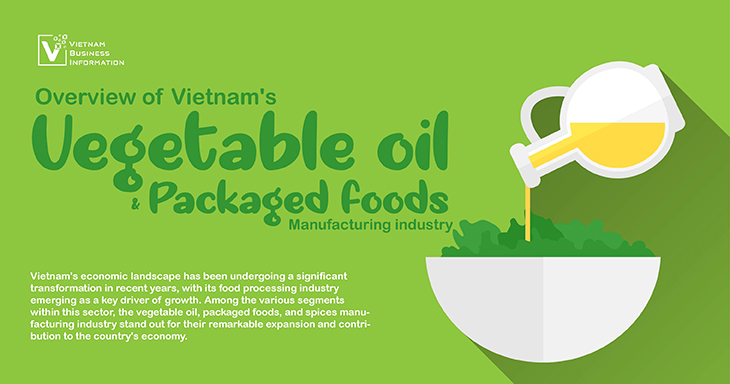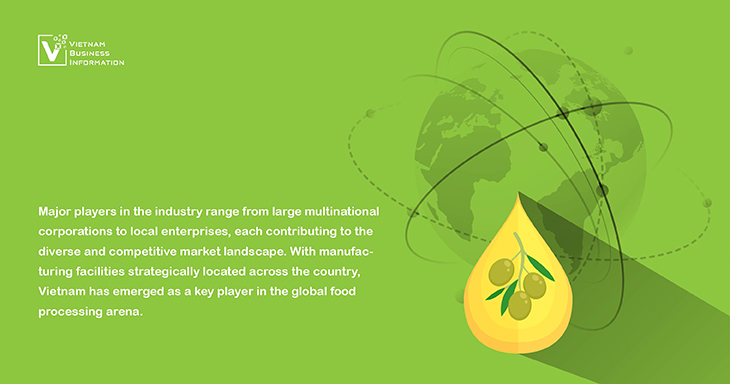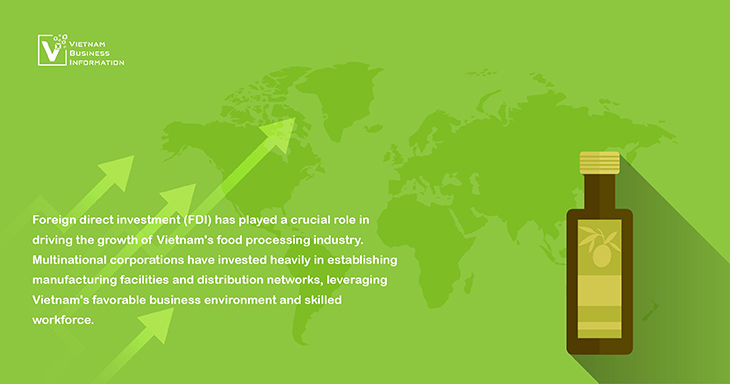Published Jun 2024
Overview of Vietnam's vegetable oil and packaged foods manufacturing industry
Vietnam's economic landscape has been undergoing a significant transformation in recent years, with its food processing industry emerging as a key driver of growth. Among the various segments within this sector, the vegetable oil, packaged foods, and spices manufacturing industry stand out for their remarkable expansion and contribution to the country's economy.

Historical context
The roots of Vietnam's food processing industry can be traced back to its rich agricultural heritage. Traditionally, food processing in Vietnam was largely decentralized and manual, with small-scale operations prevalent across the country. However, with the advent of modernization and industrialization, the sector has undergone a profound evolution.
Government policies and initiatives have played a pivotal role in fostering the growth of the food processing industry. In particular, strategic investments in infrastructure, technology, and human capital have provided a solid foundation for the expansion of various sub-sectors, including vegetable oil, packaged foods, and spices manufacturing.
Current landscape
Today, Vietnam boasts a vibrant and dynamic vegetable oil, packaged foods, and spices manufacturing industry. According to recent statistics, the sector has experienced robust growth, driven by increasing consumer demand, urbanization, and changing dietary preferences.
Major players in the industry range from large multinational corporations to local enterprises, each contributing to the diverse and competitive market landscape. With manufacturing facilities strategically located across the country, Vietnam has emerged as a key player in the global food processing arena.

Market dynamics
Several factors have contributed to the growth and dynamism of Vietnam's vegetable oil, packaged foods, and spices manufacturing industry. Firstly, rising disposable incomes and changing lifestyles have fueled demand for convenient and value-added food products. This has led to an increased focus on innovation and product diversification within the industry.
Furthermore, advancements in technology have revolutionized manufacturing processes, enabling greater efficiency, quality, and scalability. From automated production lines to state-of-the-art packaging solutions, Vietnamese manufacturers have embraced modern techniques to enhance productivity and competitiveness.
Challenges and opportunities
Despite its rapid growth, the vegetable oil, packaged foods, and spices manufacturing industry in Vietnam face a range of challenges. Supply chain issues, including sourcing raw materials and distribution logistics, remain significant hurdles for manufacturers. Moreover, ensuring food safety and quality control continues to be a top priority amidst increasingly stringent regulations.
However, amidst these challenges lie abundant opportunities for growth and expansion. With Vietnam's strategic location and access to key markets, there is immense potential for exporting high-quality food products to international destinations. Additionally, the growing trend towards healthy and organic foods presents an opportunity for manufacturers to capitalize on niche markets and cater to evolving consumer preferences.
Investment and government support
Foreign direct investment (FDI) has played a crucial role in driving the growth of Vietnam's food processing industry. Multinational corporations have invested heavily in establishing manufacturing facilities and distribution networks, leveraging Vietnam's favorable business environment and skilled workforce.

Furthermore, the Vietnamese government has implemented various policies and incentives to attract investment and promote industry growth. From tax incentives to streamlined regulatory processes, these measures aim to stimulate innovation, enhance competitiveness, and create a conducive environment for sustainable development.
Sustainability and environmental concerns
In recent years, there has been growing awareness of sustainability and environmental conservation within the food processing industry. Vietnamese manufacturers are increasingly adopting eco-friendly practices, such as utilizing renewable energy sources and implementing waste management strategies.
Moreover, stringent environmental regulations and consumer demand for ethically sourced products are driving industry players to prioritize sustainability throughout the supply chain. From responsible sourcing of raw materials to eco-friendly packaging solutions, sustainability has become a key differentiator for companies seeking to gain a competitive edge in the market.
Future outlook
Looking ahead, the future of Vietnam's vegetable oil, packaged foods, and spices manufacturing industry appears promising. With continued investment in technology, infrastructure, and human capital, the sector is poised for further growth and innovation. Moreover, the country's participation in regional and international trade agreements offers new opportunities for market expansion and diversification.
In conclusion, Vietnam's vegetable oil, packaged foods, and spices manufacturing industry represent a dynamic and rapidly evolving sector within the country's broader food processing landscape. With its rich agricultural resources, skilled workforce, and supportive business environment, Vietnam is well-positioned to solidify its position as a leading player in the global food industry.















